
Dwight David "Ike" Eisenhower was an American military officer and statesman who served as the 34th president of the United States from 1953 to 1961. During World War II, he served as Supreme Commander of the Allied Expeditionary Force in Europe, and achieved the rare five-star rank of General of the Army. He was responsible for planning and supervising the invasion of North Africa in Operation Torch in 1942–1943 and the successful invasion of Normandy in 1944–1945 from the Western Front.

The Iran–Contra affair, often referred to as the Iran–Contra scandal, the McFarlane affair, or simply Iran–Contra, was a political scandal in the United States that occurred during the second term of the Reagan Administration. Senior administration officials secretly facilitated the sale of arms to the Khomeini government of the Islamic Republic of Iran, which was the subject of an arms embargo. The administration hoped to use the proceeds of the arms sale to fund the Contras in Nicaragua. Under the Boland Amendment, further funding of the Contras by the government had been prohibited by Congress.

The Whiskey Rebellion was a violent tax protest in the United States beginning in 1791 and ending in 1794 during the presidency of George Washington, ultimately under the command of American Revolutionary War veteran Major James McFarlane. The so-called "whiskey tax" was the first tax imposed on a domestic product by the newly formed federal government. Beer was difficult to transport and spoiled more easily than rum and whiskey. Rum distillation in the United States had been disrupted during the Revolutionary War, and whiskey distribution and consumption increased after the Revolutionary War. The "whiskey tax" became law in 1791, and was intended to generate revenue for the war debt incurred during the Revolutionary War. The tax applied to all distilled spirits, but consumption of US whiskey was rapidly expanding in the late 18th century, so the excise became widely known as a "whiskey tax". Farmers of the western frontier were accustomed to distilling their surplus rye, barley, wheat, corn, or fermented grain mixtures to make whiskey. These farmers resisted the tax. In these regions, whiskey often served as a medium of exchange. Many of the resisters were war veterans who believed that they were fighting for the principles of the American Revolution, in particular against taxation without local representation, while the federal government maintained that the taxes were the legal expression of Congressional taxation powers.

The University of Hawaiʻi System, formally the University of Hawaiʻi and popularly known as UH, is a public college and university system that confers associate, bachelor's, master's, and doctoral degrees through three universities, seven community colleges, an employment training center, three university centers, four education centers and various other research facilities distributed across six islands throughout the state of Hawaii in the United States. All schools of the University of Hawaiʻi system are accredited by the Western Association of Schools and Colleges. The UH system's main administrative offices are located on the property of the University of Hawaiʻi at Mānoa in Honolulu CDP.
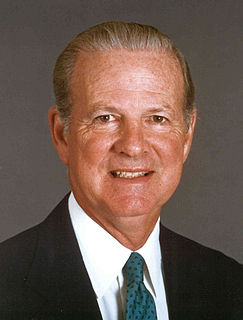
James Addison Baker III is an American attorney, statesman, and political figure. He served as White House Chief of Staff and United States Secretary of the Treasury under President Ronald Reagan, and as U.S. Secretary of State and White House Chief of Staff under President George H. W. Bush.

The University of Hawaiʻi at Mānoa is a public land-grant research university in Mānoa, a neighborhood in Honolulu, Hawaii, United States. It is the flagship campus of the University of Hawai'i system and houses the main offices of the system. Most of the campus occupies the eastern half of the mouth of Mānoa Valley, with the John A. Burns School of Medicine located adjacent to the Kakaʻako Waterfront Park.

The University of Hawaiʻi at Hilo is a public university in Hilo, Hawaiʻi. It is one of ten general campuses of the University of Hawaiʻi system. It was founded as Hawaiʻi Vocational College in 1941. In 1970 it was reorganized by an act of the Hawaiʻi State Legislature.
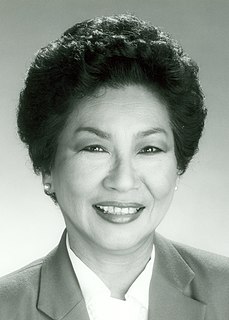
Patricia Hatsue Saiki is an American politician and former educator from Hilo, Hawaii. She served as a Republican in Congress from 1987 to 1991 and then as Administrator of the Small Business Administration under President of the United States George H. W. Bush.
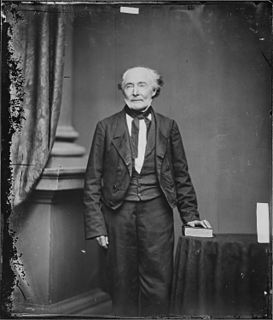
Robert John Walker was an American lawyer, economist and politician. An active member of the Democratic Party, he served as a member of the U.S. Senate from Mississippi from 1835 until 1845, as Secretary of the Treasury from 1845 to 1849 during the administration of President James K. Polk, and briefly as Territorial Governor of Kansas in 1857. He was responsible for drafting the 1849 bill that eventually established the United States Department of the Interior.

Michael Hayden Armacost is a retired American diplomat and a fellow at Stanford University's Freeman Spogli Institute. He was acting United States Secretary of State during the early days of the administration of President George H. W. Bush, before Secretary James Baker was confirmed by the Senate. Armacost also served as United States Ambassador to Japan and the president of the Brookings Institution from 1995 to 2002.
William Chase Richardson received a Bachelor of Arts degree from Trinity College (Connecticut) and a Master in Business Administration degree (1964) and a Ph.D. from the University of Chicago (1971).
A provost is the senior academic administrator at many institutions of higher education in the United States and Canada and the equivalent of a deputy vice-chancellor at some institutions in the United Kingdom, Ireland, and Australia. Additionally, the heads of certain colleges in the UK and Ireland are called provosts; it is, in this sense, the equivalent of a master at other colleges.
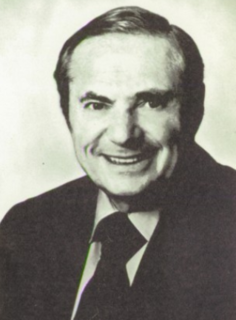
Milton Jerrold Shapp was the 40th Governor of the Commonwealth of Pennsylvania from 1971 to 1979 and the first Jewish governor of Pennsylvania. He was also the first governor of Pennsylvania to take advantage of an amendment to the state constitution lifting the ban on state governors succeeding themselves in office and authorizing them to serve a maximum of two consecutive terms at a time, while still requiring a minimum of four years out of office between any two stints.
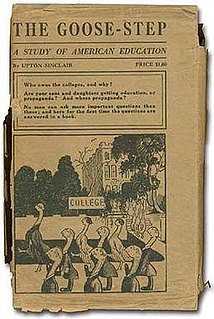
The Goose-step: A Study of American Education is a book, published in 1923, by the American novelist and muckraking journalist Upton Sinclair. It is an investigation into the consequences of plutocratic capitalist control of American colleges and universities. Sinclair writes, “Our educational system is not a public service, but an instrument of special privilege; its purpose is not to further the welfare of mankind, but merely to keep America capitalist." (p. 18)

Henry P. Caulfield Jr. was an American political scientist who had a long and distinguished career in public service with the U.S. Department of the Interior, culminating as the first director of its U.S. Water Resources Council, before becoming professor of political science at Colorado State University. He served on many boards and advisory committees and as a consultant to water resources agencies worldwide, and received awards for his service. Caulfield was born in New York City, and died in Fort Collins, Colorado, where he retired in 1986.
Howard Brett Melendy was a prominent American historian, writer, researcher, publisher, autobiographer, dean, history professor, and filipinologist. Melendy was a professor and administrator at the San José State University in California and the University of Hawai'i. As a professor, he taught about the history of California and United States history. He was the first chairman of the history department of San José State University. He was a life member of the American Historical Association.
Donald Silvio Nesti, C.S.Sp. is an American Catholic priest in the Congregation of the Holy Spirit. He served as the tenth president of Duquesne University in Pittsburgh, Pennsylvania, from 1980 until 1988. He is the founder and current director of the Center for Faith and Culture at the University of Saint Thomas in Houston, Texas, and a professor of theology at St. Mary's Seminary, also in Houston.

Kenneth Lewis Kraft was a professor of Buddhist studies and Japanese religions (emeritus) at Lehigh University in Bethlehem, Pennsylvania.

William Feiner was a German Catholic priest and Jesuit who became a missionary to the United States and eventually the president of Georgetown College, now known as Georgetown University.














